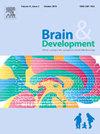髓鞘少突胶质细胞糖蛋白抗体相关性大脑皮质脑炎伴超难治性癫痫状态。
IF 1.4
4区 医学
Q4 CLINICAL NEUROLOGY
引用次数: 0
摘要
背景:髓鞘少突胶质细胞糖蛋白抗体相关性脑皮质脑炎(MOG-CCE)患者常有癫痫发作的报道。然而,急性期癫痫发作的处理方法尚未确定:病例报告:一名 9 岁的健康男孩因持续发热约 6 天、头痛和意识改变就诊。平扫 T2 加权和液体减弱反转恢复成像显示,双侧额叶、顶叶、颞叶和岛叶皮质肿胀和异常高强度病变,以左半球为主。意识障碍持续存在,局灶性肌阵挛发作每小时一次。通过调整硫喷妥剂量可以抑制癫痫发作,但减少剂量后又会复发,患者表现出超难治性癫痫状态。长期使用硫喷妥的不良反应开始显现。因此,开始持续输注氯胺酮和鞘内地塞米松疗法(IT-DEX)。使用氯胺酮和 IT-DEX 后,他的癫痫发作迅速停止。转院时脑脊液和血清中的 ani-MOG 抗体均呈阳性,因此患者被诊断为 MOG-CCE 患者。患者接受了三个疗程的甲基强的松龙脉冲静脉注射治疗,随后在 6 个月内逐渐减少口服强的松龙的剂量。结论:结论:在MOG-CCE中,一些病例可能在急性期出现超级难治性癫痫状态(SRSE),并且对抗癫痫药物难治,类似于发热感染相关癫痫综合征。IT-DEX 和持续输注氯胺酮有助于控制 MOG-CCE 的癫痫发作。本文章由计算机程序翻译,如有差异,请以英文原文为准。
Myelin oligodendrocyte glycoprotein antibody-associated cerebral cortical encephalitis with super-refractory status epilepticus
Background: Seizures are commonly reported in patients with myelin oligodendrocyte glycoprotein antibody-associated cerebral cortical encephalitis (MOG-CCE). However, seizure management during the acute phase has not been established. Case Report: A 9-year-old previously healthy boy presented with fever persisting for approximately 6 days, along with headache and altered consciousness. Plain T2-weighted and fluid-attenuated inversion recovery imaging showed swelling and abnormal hyperintense lesions in the bilateral frontal, parietal, temporal, and insular cortices with left hemisphere predominance. Consciousness disturbance persisted, and focal myoclonic seizures clustered hourly. Seizures were arrested by titrating the thiopental dose but recurred with dose reduction, and the patient exhibited super refractory status epilepticus. Adverse effects due to long-term use of thiopental became apparent. Hence, continuous infusion of ketamine and intrathecal dexamethasone therapy (IT-DEX) was started. After administration of ketamine and IT-DEX, his seizure was arrested promptly. The cerebrospinal fluid and serum at the time of transfer were clear positive for ani-MOG antibody; therefore, the patient was diagnosed with MOG-CCE. The patient received three courses of intravenous methylprednisolone pulse therapy, followed by oral prednisolone gradually tapered over 6 months. He did not experience any relapse for 6 months. Conclusion: In MOG-CCE, some cases may present with super-refractory status epilepticus (SRSE) in the acute phase and be refractory to anti-seizure medication, analogous to febrile infection-related epilepsy syndrome. IT-DEX and continuous infusion ketamine are useful for seizure control in MOG-CCE.
求助全文
通过发布文献求助,成功后即可免费获取论文全文。
去求助
来源期刊

Brain & Development
医学-临床神经学
CiteScore
3.60
自引率
0.00%
发文量
153
审稿时长
50 days
期刊介绍:
Brain and Development (ISSN 0387-7604) is the Official Journal of the Japanese Society of Child Neurology, and is aimed to promote clinical child neurology and developmental neuroscience.
The journal is devoted to publishing Review Articles, Full Length Original Papers, Case Reports and Letters to the Editor in the field of Child Neurology and related sciences. Proceedings of meetings, and professional announcements will be published at the Editor''s discretion. Letters concerning articles published in Brain and Development and other relevant issues are also welcome.
 求助内容:
求助内容: 应助结果提醒方式:
应助结果提醒方式:


